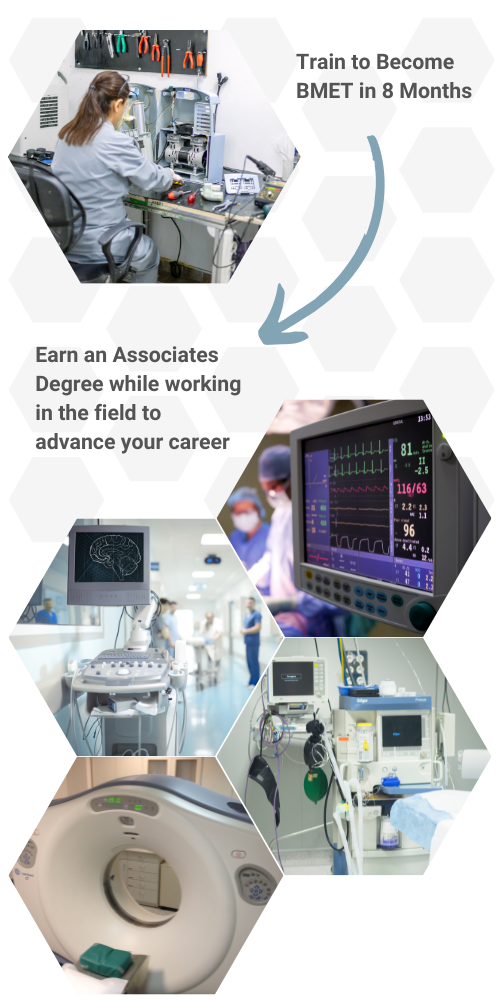Biomedical Programs
8 month, hands-on Biomedical Technology program aimed at preparing you for a BMET career.
1.5 Year Biomedical Engineering Associate Degree to open further career opportunities in healthcare technology.
Request More Info
Submit form for more program information.
We Respect Your Privacy
Requests for information are sent directly to SCIT's Admissions Office. Your information is not and will not be provided to any third parties.
- CALL TO LEARN MORE: 714-300-0300
- SEND AN EMAIL: admissions@scitech.edu
Financial Aid available to those who qualify
SCIT is approved to participate in veterans education benefits programs
DIPLOMA
Biomedical Technology
The Biomedical Technology Diploma is an 8-month, career targeted program that trains students to troubleshoot and repair medical equipment used throughout the healthcare industry. The program covers a broad spectrum of medical equipment found throughout medical centers and hospitals, including patient monitors, infusion pumps, ventilators, and much more. BMET’s are vital in supporting the healthcare industry by regularly servicing the medical devices used by healthcare providers every day.
ASSOCIATE OF SCIENCE DEGREE
Biomedical Engineering Technology
After completing the Biomedical Technology Diploma, eligible graduates have the option to continue toward earning an Associate of Science Degree in Biomedical Engineering Technology. The ASBET degree is an accelerated, evening degree program that can be completed in less than 1.5 years and expands on healthcare technology topics to further graduates careers in the biomedical field.
PATHWAY TO CAREER IN HEALTHCARE TECH

LEARN BY DOING
Hands-On Lab Projects
Students work in a variety of SCIT’s Lab Facilities to gain practical hands-on experience and better link theory to practice.
All images below are from SCIT's Labs






KEY COURSE TOPICS
Biomedical Technology
In the Biomedical Technology program, students begin with fundamental concepts in electronics and human physiology; they then move towards the function and operation of medical devices; finally, they inspect and troubleshoot medical devices. Students are also introduced to computer hardware and networking principles.
Electronic Fundamentals
Computer Hardware and Networking
Biomedical Instrumentation
General Biomedical Maintenance
A.S. Biomedical Engineering Technology
In the A.S. Biomedical Engineering program, student learn about electronic systems, healthcare compliance, and more advanced preventative maintenance subjects.
Digital Electronics
Preventative Maintenance - Therapeutics
Preventative Maintenance - Diagnostics
Circuit Analysis
Physiology for Biomedical Technology
Healthcare Technology Compliance
Career Pathway Program Design
Take shorter programs first to acquire the skills needed for employability. Build up from there by working while studying toward a degree.
Fast-Track Biomedical Education
Work experience is critical to advance a career, especially in the healthcare technology space. Through SCIT’s Biomedical Career Pathway program design, students first train to enter the biomedical field after completing their 8 month diploma. From there, eligible students have the option to continue toward earning a degree in the evenings while gaining work experience.


About SCIT
SCIT was founded over 35 years ago by a team of engineers and educators in Anaheim, CA with a vision to build an institution that prides itself on providing quality technical education. With a single campus location, SCIT's over 15,000 graduates work in a variety of companies based in California and throughout the nation.
ACCREDITATION: SCIT is accredited by the Accrediting Commission of Career Schools and Colleges (ACCSC).
BPPE: Southern California Institute of Technology is a private institution approved to operate in the State of California by the Bureau for Private Postsecondary Education. Approval to operate means being in compliance with state standards as set forth in the CEC and 5, CRC. For more information, contact the Bureau for Private Postsecondary Education at 1747 North Market Blvd., Suite 225, Sacramento, CA 95833, www.bppe.ca.gov, toll-free telephone number (888) 370-7589 or by fax (916) 263-1897.
VA: SCIT is approved to participate in veterans education benefits programs under Title 38 of the GI Bill® for eligible veteran students. GI Bill® is a registered trademark of the U.S. Department of Veterans Affairs (VA). More information about education benefits offered by VA is available at the official U.S. government website at http://www.benefits.va.gov/gibill.
DOE: SCIT is an eligible institution participating in federal financial aid programs. Financial aid is available to those who qualify. The U.S. Department of Education has approved Southern California Institute of Technology for participation in the following programs: Federal Pell Grant, Federal Supplemental Education Opportunity Grant (FSEOG), Federal Direct Subsidized Loans, Federal Direct Unsubsidized Loans, Federal Parent Loans to Undergraduate Students (PLUS), and Federal Work Study (FWS).
DIR: SCIT is approved by the California Department of Industrial Relations, Division of Apprenticeship Standards to offer the Whole General Electrician Curriculum (Approved School #145).
WIOA: SCIT is approved for WIOA training benefits from various Workforce Investment Boards.
DHS: SCIT is approved to issue I-20's to admit foreign students.
